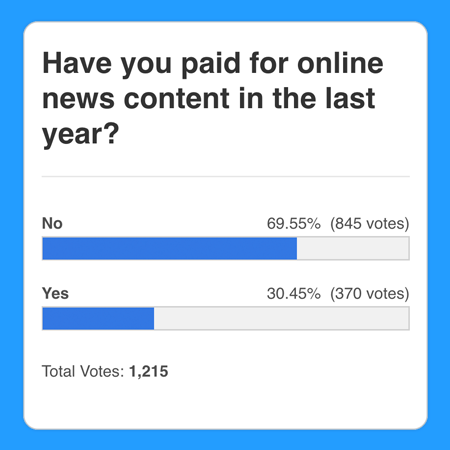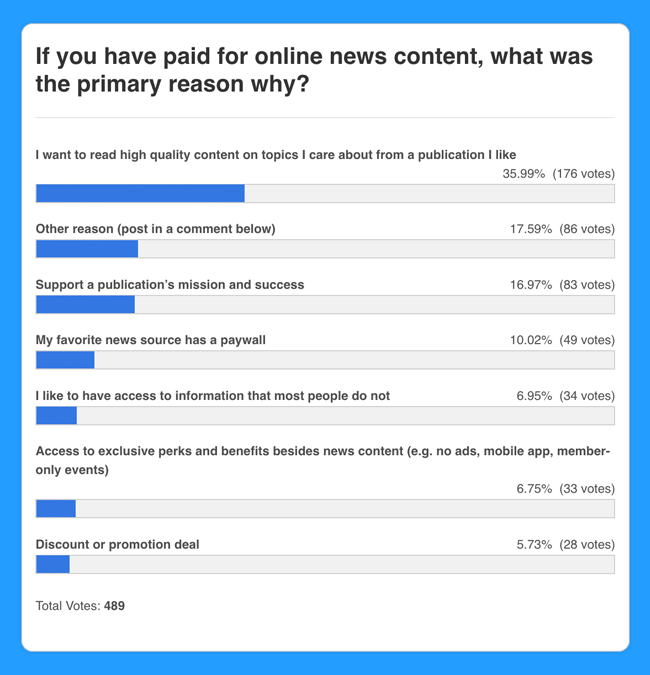We recently polled readers and commenters about whether or not they pay for online news and why. By examining the current sentiment around paying for news, we hope to provide publishers with insights that will help them build successful businesses supported by loyal, engaged readers. Today, we’re sharing the results of our research and summarizing the feedback readers provided.
How many readers have paid for online news in the past year?

Based on 1,215 votes collected over a four week period, 30.45% of respondents said that they have paid for online news in the last year.
The reasons why readers pay for online news
We asked readers that pay for online news for the primary reason behind their decision. Overall, we received 465 comments in the blog post, which we curated below to highlight the most insightful responses.

Here’s a summary of our key takeaways:
- The top three reasons why readers pay for online news are to read high quality content, fund journalism’s role in society, and support a publication’s mission. With so much free content readily available on the web, publishers have to provide a compelling value proposition that readers believe is worth paying for. Furthermore, readers increasingly see journalism as a critical institution that needs more funding.
- Some publications employ paywalls (e.g. NYT, WaPo, WSJ) to encourage readers to subscribe. Typically, readers are able to read a limited sample of articles before being asked to subscribe for continued access. Readers, however, expect a mutual exchange of value when they pay for content.
- Getting access to information that most people do not have drove the purchase decision for about 7% of respondents. Similarly, 6.75% of respondents paid for news because they received additional perks that increased the perceived value of their subscription. This could include benefits such as an ad-free experience, exclusive content, access to a mobile app, or member-only events. We didn’t receive many comments about these specific reasons, so if you voted for them and would like to weigh in, post a comment in the discussion below.
“I want to read high quality content on topics I care about from a publication I like”
The most common reason why people pay for online news is for access to high quality content from a publication they like. Readers consider news to be high quality if the content isn’t clickbait, the reporting is unbiased, and the publisher is considered trustworthy.
“I want to support journalism’s role in society”
Readers also shared reasons for why they pay for online news that weren’t listed in our poll question. The most common reason readers shared is they wanted to support journalism’s role in society. Readers talked about the increased importance of journalism to keep people informed and to facilitate important discussions.
“I want to support a publication’s mission and success”
Approximately 17% of respondents pay for online news because they want to support a publication’s mission and success. National news publishers like The Washington Post, New York Times, and Wall Street Journal garnered the most mentions among publications that readers subscribe to. This isn’t surprising as these publications are experiencing record-breaking growth in digital subscriptions. Sites including Naked Capitalism, Ars Technica, and Detroit Free Press also received mentions.
Why people don’t pay for online news
While more consumers today pay for online news than ever before, the reality is that most people still don’t. In fact, nearly 70% of poll respondents reported that they have not paid for online news in the last year. To understand why, we invited readers to share their thoughts. Here are the most common reasons readers cited for why they don’t pay for online news:
- The same news content can be found for free elsewhere online.
- There isn’t a publication I like/trust enough to pay for access to their content.
- Subscriptions are too expensive.
Wrapping Up
Thanks to everyone who participated in our poll and shared their feedback with us! What did you think of the results? Do you agree/disagree with the findings? We’d love to hear from you in the discussion below! We read every comment here and appreciate any feedback you have to share.
